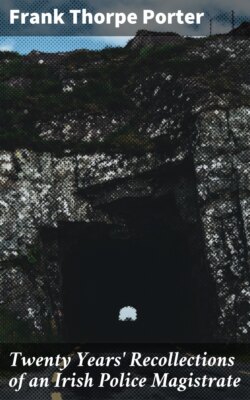Читать книгу Twenty Years' Recollections of an Irish Police Magistrate - Frank Thorpe Porter - Страница 5
На сайте Литреса книга снята с продажи.
OLD PRISONS.
ОглавлениеTable of Contents
Before I proceed to the details of some other narratives, I trust that my readers will not censure me for submitting to their perusal incidents connected with real or imputed crimes, and asking them to accompany me, even in imagination, to prison scenes. There is scarcely a novelist of celebrity that has not frequently introduced his readers to such places, and generally without exciting any repugnance to his description of them, or to the narratives which they supply or the subjects they suggest. Although the prison may disappear and be replaced by other structures, even of a different character, its ideal existence continues, and perhaps outlasts those that arose on its foundations or in its vicinity. In Paris, the Bastille is spoken of as if it still existed. The name is inscribed on omnibusses, and the cab-driver asks no further explanation when ordered to drive "a la Bastille." A house within a short distance of the place where it stood displays on a sign-board a view of the old fortress-prison; and few strangers pass it during the day without pausing to gaze on the picture of a building to which history refers so many fearful incidents, exaggerated nevertheless most enormously by the unscrupulous revolutionists who introduced a "reign of terror" of greater extent, and more sanguinary atrocity, than the records of all the state prisons of France could supply. The Chateau of Vincennes is an existing building; visited more for the memories of the past than for the attractions of the present or the hopes of the future; and few visitors leave it without gazing on the spot where, at midnight, the hapless Duc D'Enghien received the fatal volley and filled an untimely grave. Many prisons in England are associated with local traditions or historical events highly interesting; but the lapse of time and the habitudes of a people exceptionally romantic have deprived them of an extensive popular appreciation. The Tolbooth of Edinburgh and the building of the same designation in Glasgow have derived a lasting fame from the pen of Scott; and whilst the English language exists, the readers of the "Heart of Mid-Lothian" or "Rob Roy" will have the Tolbooths vividly impressed on their imaginations. There are anecdotes connected with the old prisons of Ireland, many of which would afford most ample subjects for the writer of Romance, whilst even their simple details would fully verify the adage that "Fact is stranger than Fiction." I shall now proceed to a narrative which refers to a period more than a century past, but in which, as to names and dates, the crown-office records of the time fully agree with the statements which I have heard from the descendants of some of the most respectable characters connected, but in no discreditable manner, with the circumstances detailed.
There may still be seen on the right hand side of the road leading from Dublin through Mount Brown to Inchicore, a small portion of a granite wall which formerly was in front of "Old Kilmainham," the common gaol of the County of Dublin. That building was considered one of the worst prisons of the kingdom, in consequence of its insufficient size and lax discipline. Swift is said to have been, in his youthful days, a frequent, although not a criminal visitor at this old gaol; and there, perhaps, in the conversation of its inmates, he acquired much of the coarseness and indelicacy which mar the wit and vigor of his productions. I shall, however, most willingly and scrupulously abstain from offering to my readers any specimens of the language of such a time and place, when the building echoed with drunken revelry, and the sufferings of a prisoner were aggravated by indecent buffoonery or ribald jests. To my narrative such expressions are neither necessary nor ornamental.
